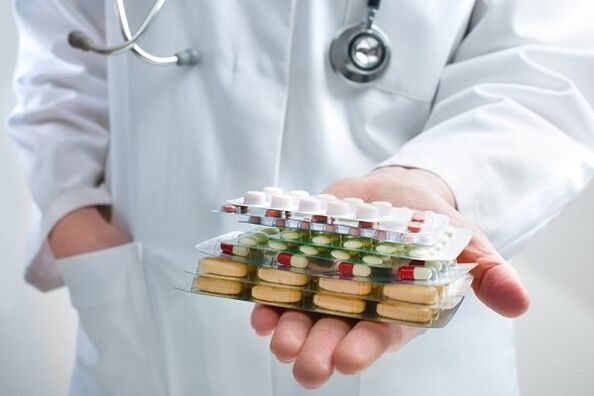Prostate inflammation is a common disease among men of all ages;The pathology is diagnosed especially in patients over 50 years of age.The disease greatly impairs quality of life, causes problems with urination, fertility and potency, and also causes pain.

Diseases must be treated quickly and thoroughly.To do this, the patient is prescribed medications, physiotherapy and a healthy lifestyle.Antibiotics for bacterial prostatitis are one of the main methods of treatment, but it is very important to choose the right drug and dosage for the therapy to be effective.
Indications for the use of antibacterial compounds.
Before thinking about what antibiotics to take for prostatitis, it is necessary to understand the cause of its occurrence.Contrary to the opinion of many patients, inflammation of the prostate occurs not only due to infection, but also due to degenerative disorders in the organ.In the latter case, non-infectious prostatitis is detected.
To diagnose the disease, a tank culture or PRC analysis is performed, with the help of which the doctor will detect the pathogen.If no bacteria have been identified, it is not necessary to take antibiotics.In this case, symptomatic therapy, diet, physiotherapy and adequate sexual activity are indicated.

If leukocytes were found in the secretion of the prostate and a pathogen was also identified, bacterial or tuberculous prostatitis is diagnosed.Both types of diseases require specific treatment with antibiotics.
A PRC analysis is often sufficient, providing results the next day.After identifying the bacteria, the doctor prescribes a suitable antibiotic for prostatitis.If treatment is not effective, a tank culture of the prostate juice will need to be performed to determine sensitivity to the antibacterial agent.
Antibiotic groups
Only a doctor can answer precisely which antibiotics to take for prostatitis.Because first you have to detect the bacteria.If you self-medicate, there is a high risk of not guessing the group and transforming the disease into a chronic form, which will significantly complicate the treatment process.
It is also necessary to understand that the cause of the pathology may be a fungal infection, not a bacterial one.In this case, antibiotics will not help;you will need to take a medication with antifungal effect.

Treatment of acute and chronic forms of the disease is carried out using the following groups of drugs:
- Tetracyclines.It is prescribed if bacteria are detected: ureaplasma, mycoplasma, enterobacteria, chlamydia, klibsiella, enterococci, pseudomanada, seratia, E. coli.
- Fluoroquinolone.Prescribed for the following bacteria: ureaplasma, mycoplasma, gonococci, chlamydia, Proteus, Klebsiella, Escherichia coli and Koch's bacillus.
- Penicillin.Indicated if: gonococci, enterobacteria, enterococci, Klebsiella, Proteus, Seratia, Escherichia coli are detected.
- Cephalosporins.Prescribed for the following bacteria: Enterobacteriaceae, Enterococci, Klebsiella, Proteus, E. coli.
- Macrolides.Indicated if: gonococci, chlamydia, ureaplasma, mycoplasma are detected.
- Aminoglycosides.Prescribed for the following bacteria: Klebsiella, Enterobacteriaceae, Pseudomonas.
- Hydroxyquinolines.Effective against the following bacteria: ureaplasma, mycoplasma, trichomonas, klibsiella, E. coli, etc.
Most often, drugs from the penicillin and cephalosporin group are prescribed.Macrolides are used very rarely, as they are not particularly effective for prostatitis.Tetracyclines have side effects, so they are rarely prescribed if other medications cannot be taken.
Aminoglycosides are effective for acute prostatitis.They penetrate the prostate and accumulate there, allowing you to get rid of the infection.For the treatment of chronic diseases, this antibiotic is usually not prescribed, since it is not possible to achieve the required concentration of the substance in the gland.
For chronic prostatitis of the bacterial type, doctors usually choose a group of fluoroquinolones.For inflammation of the prostate they are the most effective.
But it is worth noting that fluoroquinolones have serious side effects and should not be taken until tuberculosis has been diagnosed.Such drugs for prostate tuberculosis should be taken in combination with other antibiotics;Otherwise, the treatment will be ineffective and the patient will only waste time.
List of antibiotics for prostatitis.
The best antibiotics for prostatitis are those that were selected based on the results of an examination by an experienced doctor.There is no magic pill for all diseases;All medications are effective in one case or another.It is very important to choose exactly the right substance to treat a specific type of prostatitis of the identified pathogen.

The pharmaceutical market offers a wide range of drugs from each group:
- penicillins;
- cephalosporins;
- aminoglycosides.
Medications from the tetracycline group are rarely prescribed.Macrolides are mainly indicated in the fight against mycoplasmas and chlamydia.
One of the most effective drugs for the treatment of prostatitis is a drug that belongs to the group of hydroxyquinolines.The product helps to eliminate most of the microorganisms that cause inflammation of the prostate and urinary tract, and the drug also has an antifungal effect.
Dosages for men are prescribed individually, depending on the cause of the pathology, the features of taking a particular drug and its form of release.
For example, an antibiotic is prescribed, 3 tablets a day, in the morning during lunch and in the evening.And another may be prescribed to administer 1 ampoule per day intramuscularly, at the same time.Treatment is carried out in one course;The medication cannot be stopped early even if improvements appear.
Conclusion
Every patient must remember that antibiotics are very serious drugs, the uncontrolled use of which can cause complications.Therefore, if a man has symptoms of prostatitis, he should consult a urologist-andrologist as soon as possible and get tested.Only on the basis of an accurate diagnosis can antibiotics be prescribed.























